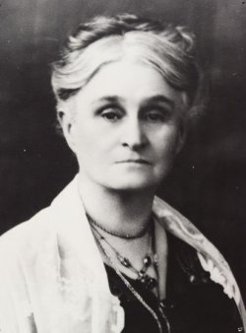These stories may contain descriptions of childhood trauma and abuse. Aboriginal and Torres Strait Islander people should be aware that this website may contain images, voices or names of people who may have passed away. If you need help, you can find contact details for some relevant services on our support page.
Australia’s first female parliamentarian, Edith Cowan (1861-1932), was in kinship care from age fourteen.
Edith Dircksey Brown was born at a sheep station near Geraldton in Western Australia (WA). Edith was seven years old when her mother, teacher Mary Eliza Dircksey Witenoom, died in childbirth. After the death of his first wife, explorer and pastoralist Kenneth Brown separated the six children and sent Edith to boarding school in Perth.
For Edith, as for her sister, the sudden removal to a boarding school can have had the effect only of a double bereavement. She had lost in effect both her parents, and the surroundings and life she had known (Cowan).
Seven years later, Kenneth Brown killed his second wife.
Constable James Thompson was first on the scene and discovered Brown standing near the body and holding one of his daughters. Brown told him,
There she is, dead enough. I have done it, there is no use denying it. For God’s sake let me have one last look at her before you take me away (Acott).
Kenneth Brown was executed on 10 June 1878; up until then he was regularly visited by Edith.
For the remainder of her childhood Edith lived much of the time with her grandmother, Eliza Brown, in the Perth suburb of Guildford. She finished her schooling with Canon Sweeting at a small school in Guildford.
Edith married James Cowan in 1879. James began his working life in the post office, but ended it as registrar and master of the Supreme Court and Police Magistrate.
Edith Cowan was active in the community throughout her life. She helped found the Karrakatta Club in 1894, the first women’s club in Australia; she worked on providing better health services for her area; she assisted with setting up the Children’s Protection Society and lobbied for a Children’s Court to be established; she helped set up day care centres and worked to introduce sex education in school.
In 1921, Edith Cowan campaigned—and won—on her community service record for the WA seat of West Perth.
Cowan used her term to promote migrant welfare, infant health centres and women’s rights: she ‘was convinced of the necessity of motherhood endowment’, even defended the idea, in parliament, of a housewives’ union, and continued to press for sex education in state schools. The Women’s Legal Status Act, which she introduced in 1923 as a private member, opened the legal profession to women (Brown).
Edith Cowan is commemorated in a number of ways. Edith Cowan University in WA is named after her as is the federal electoral division of Cowan in WA. A memorial—the Edith Dircksey Cowan Memorial—was built in 1934 and stands in Kings Park in Perth. Edith Cowan is also featured on Australia’s $50 note (along with Aboriginal Australian David Unaipon). Her portrait hangs in the Art Gallery of Western Australia.
References:
Acott, Kent. “Cowan’s dad revealed in archives.” Mid-West Times, 18 January 2017. Available here
Brown, Margaret. “Cowan, Edith Dircksey (1861–1932).” Australian Dictionary of Biography, vol. 8 (1981). https://adb.anu.edu.au/biography/cowan-edith-dircksey-5791
Constable, E. & Phillips, H. “Edith Cowan. One of Australia’s Greatest Women.” Information sheet, available here
Cowan, Peter. A Unique Position. A Biography of Edith Dircksey Cowan 1861-1932. University of Western Australia Press, 1978
Silbert, Hilbary. “Cowan of Cottesloe.” Cottesloe History, 2017. https://cottesloehistory.wordpress.com/2017/08/07/cowan-of-cottesloe/
